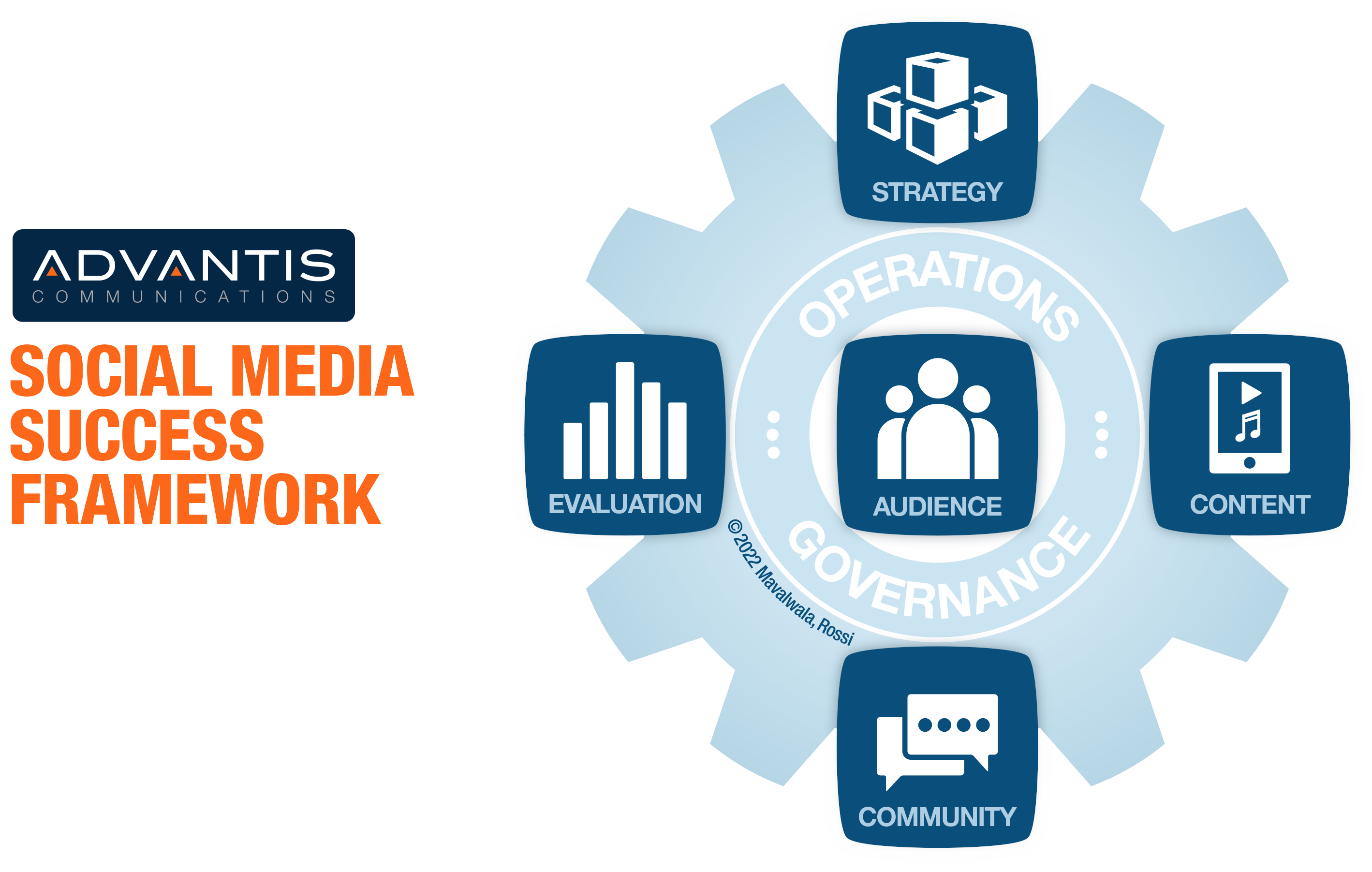In a world where communication professionals must demonstrate their value each day, effectively aligning your social media performance with your organization’s business objectives will pay dividends all year long.
Designed to improve the effectiveness of social media efforts, the Social Media Success Framework includes seven critical components. Kicking off the new year by critically analyzing each of these areas will unlock tangible business value for your organization and help elevate tacticians to strategists on your digital team.
Each domain — operations, governance, strategy, audience, content, community and evaluation — require purposeful implementation and adequate resources to realize the full potential of social media.

Operations
It's likely that over time, your team has increased in size and social media roles have expanded across multiple departments. To navigate this increasing complexity, the first step in assessing the current situation is not to look at the social platforms themselves, but rather to review the underlying operations. This means documenting exactly who does what, why they do it, when they do it and how they do it. Asking these probing questions uncovers powerful insights and guides the focus of subsequent lines of questioning.
Governance
The importance of governance is often overlooked in superficial audits that focus solely on content. Uncovering the degree of commitment to governance is the first step to creating a solid foundation for social media excellence.
Operations and governance must be aligned to ensure an efficient social media operational structure. Conduct interviews with staff to explore if and how existing inter- and intra-department policies and guidelines effectively govern current social media activities.
Strategy
Before jumping into tactics, it’s essential to focus on strategy. While social media may be free, like a free puppy — it still requires to be fed, maintained and nurtured. Adopting a strategic approach to social media will save staff time and resources while amplifying the value delivered to all stakeholders involved.
Conducting a thorough, research-based social media audit is an essential initial step in formulating a successful social media strategy. The following three questions can be used to assess where you are with social media strategic planning:
- Are S.M.A.R.T. (specific, measurable, achievable, relevant and time-bound) objectives in place for social media accounts and campaigns?
- Is the social media strategy documented, approved and shared with staff, as well as understood by them?
- Is social media integrated into the broader communication and marketing initiatives?
Audience
Most organizations we audit struggle to define the audiences their social media accounts serve. Tightly defining the target audience helps determine if and where they reside on social media and what content will resonate.
When defining your target audience, keep these three questions in mind:
- Are your audience insights based on formal or informal research? (Hint: ideally both).
- Do audience characteristics go beyond basic demographics and include psychographics, attitudes, preferences and motivations?
- Are target audiences represented by detailed personas?
If your team intimately understands the target audience, it will be easier and more efficient to produce and curate content that nourishes and serves — all within your budget and time constraints.
Content
When it comes to content, focusing on the consumption of your content versus the act of creating and disseminating it can yield significant benefits. This audience-centric mindset helps focus attention on the most important goal: defining the value provided to your target audience.
Value for your audience is not derived from creating content (output), but rather from the audience understanding it and taking the desired action (outcome). Here are the top three questions to evaluate your social media content:
- Are audience personas the basis for content creation?
- What content performs best and why? (Hint: benchmark against past performance).
- Does content reflect best practices for driving engagement?
Answering these three fundamental questions helps refocus content creation and curation efforts so that audience insights and needs, rather than corporate key messages, drive content decisions.
Community
Following this audience-centric mindset, social media is, well — social. The first questions should be:
- Is listening in place so any insights gleaned can inform future content strategy?
- Are organic posts focused on two-way communication like a conversation?
- If budget is spent on paid campaigns to increase reach and engagement, are they configured correctly to yield positive outcomes instead of low-value vanity metrics?
With the decline of organic reach, teams need to embrace paid advertising. Simply clicking a promote or boost button may be easy, but it’s not strategic. Today’s social platforms offer unprecedented targeting capabilities, but achieving a high performing campaign requires an in-depth understanding of the advertising platform.
Evaluation
The last area of focus of the Social Media Success Framework is evaluation. Demonstrating your return on investment by tying back results to the stated objectives is the right process, but value is contingent on what is being measured.
To fuel continuous improvement, plan for success by including these three questions to help unearth more value in your evaluation process:
- Is continuous improvement fuelled by measurement and evaluation?
- Are key performance indicators (KPIs) appropriate — outcomes vs. outputs?
- Is the measurement framework consistent across the organization?
Methodically moving through the process of measuring, evaluating and then extracting the right insights from the data are critical for future social success.
Dedicating time upfront to the Social Media Success Framework can yield powerful insights. Considering the existing investment of time, budget and resources in social media, it’s only prudent to optimize your efforts and to maximize impact while minimizing risk — ensuring every action contributes meaningfully to your organization's goals.
Cyrus Mavalwala, ABC, MCCyrus Mavalwala, ABC, MC is the founding partner of Advantis Communications, IABC/Toronto’s 2023 Boutique Agency of the Year. Local governments, associations and B2B Organizations across North America partner with Advantis for social media strategy, audits, training and video production. Mavalwala is one of approximately 60 people in Canada who have been awarded IABC Canada’s highest honor, Master Communicator.